普林斯顿大学校长2018毕业演讲:读书无用论是最大的谎言(中英文)
- 格式:pdf
- 大小:696.90 KB
- 文档页数:14
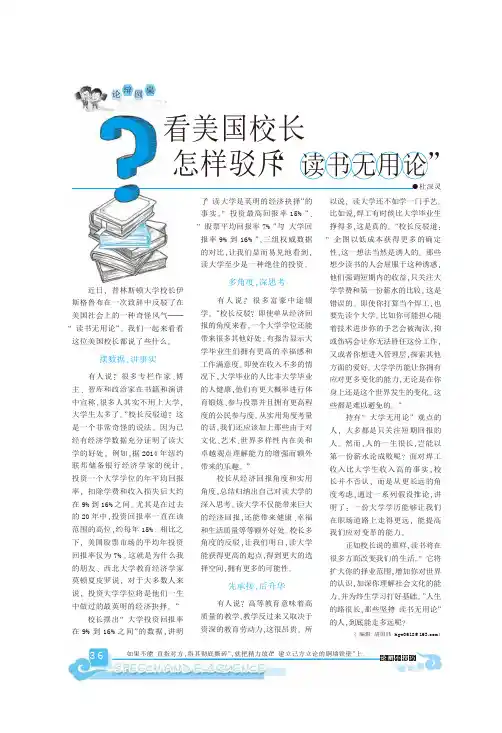
论辩圆桌近日,普林斯顿大学校长伊斯格鲁布在一次致辞中反驳了在美国社会上的一种奇怪风气———“读书无用论”。
我们一起来看看这位美国校长都说了些什么。
摆数据,讲事实有人说:“很多专栏作家、博主、智库和政治家在书籍和演讲中宣称,很多人其实不用上大学,大学生太多了。
”校长反驳道:“这是一个非常奇怪的说法。
因为已经有经济学数据充分证明了读大学的好处。
例如,据2014年纽约联邦储备银行经济学家的统计,投资一个大学学位的年平均回报率,扣除学费和收入损失后大约在9%到16%之间。
尤其是在过去的20年中,投资回报率一直在该范围的高位,约每年15%。
相比之下,美国股票市场的平均年投资回报率仅为7%。
这就是为什么我的朋友、西北大学教育经济学家莫顿夏皮罗说,对于大多数人来说,投资大学学位将是他们一生中做过的最英明的经济抉择。
”校长摆出“大学投资回报率在9%到16%之间”的数据,讲明了“读大学是英明的经济抉择”的事实。
“投资最高回报率15%”、“股票平均回报率7%”与“大学回报率9%到16%”,三组权威数据的对比,让我们显而易见地看到,读大学至少是一种绝佳的投资。
多角度,深思考有人说:“很多富豪中途辍学。
”校长反驳:“即使单从经济回报的角度来看,一个大学学位还能带来很多其他好处。
有报告显示大学毕业生们拥有更高的幸福感和工作满意度。
即使在收入不多的情况下,大学毕业的人比非大学毕业的人健康,他们有更大概率进行体育锻炼、参与投票并且拥有更高程度的公民参与度。
从实用角度考量的话,我们还应该加上那些由于对文化、艺术、世界多样性内在美和卓越观点理解能力的增强而额外带来的乐趣。
”校长从经济回报角度和实用角度,总结归纳出自己对读大学的深入思考。
读大学不仅能带来巨大的经济回报,还能带来健康、幸福和生活质量等等额外好处。
校长多角度的反驳,让我们明白,读大学能获得更高的起点,得到更大的选择空间,拥有更多的可能性。
先承接,后升华有人说:“高等教育意味着高质量的教学,教学反过来又取决于资深的教育劳动力,这很昂贵。
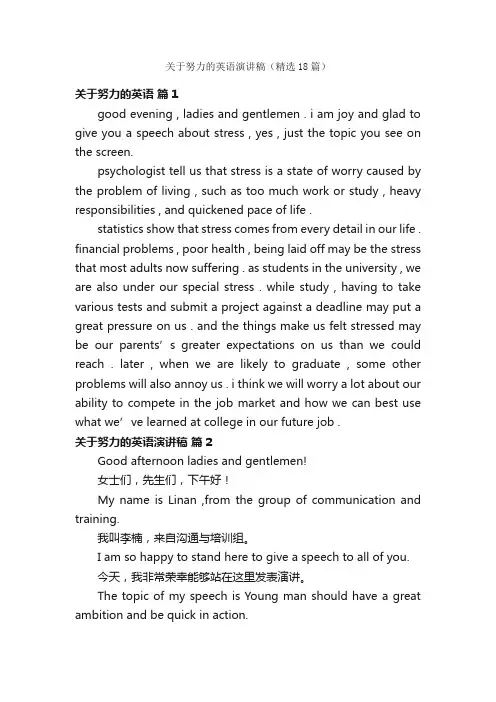
关于努力的英语演讲稿(精选18篇)关于努力的英语篇1good evening , ladies and gentlemen . i am joy and glad to give you a speech about stress , yes , just the topic you see on the screen.psychologist tell us that stress is a state of worry caused by the problem of living , such as too much work or study , heavy responsibilities , and quickened pace of life .statistics show that stress comes from every detail in our life . financial problems , poor health , being laid off may be the stress that most adults now suffering . as students in the university , we are also under our special stress . while study , having to take various tests and submit a project against a deadline may put a great pressure on us . and the things make us felt stressed may be our parents’s greater expectations on us than we could reach . later , when we are likely to graduate , some other problems will also annoy us . i think we will worry a lot about our ability to compete in the job market and how we can best use what we’ve learned at college in our future job .关于努力的英语演讲稿篇2Good afternoon ladies and gentlemen!女士们,先生们,下午好!My name is Linan ,from the group of communication and training.我叫李楠,来自沟通与培训组。
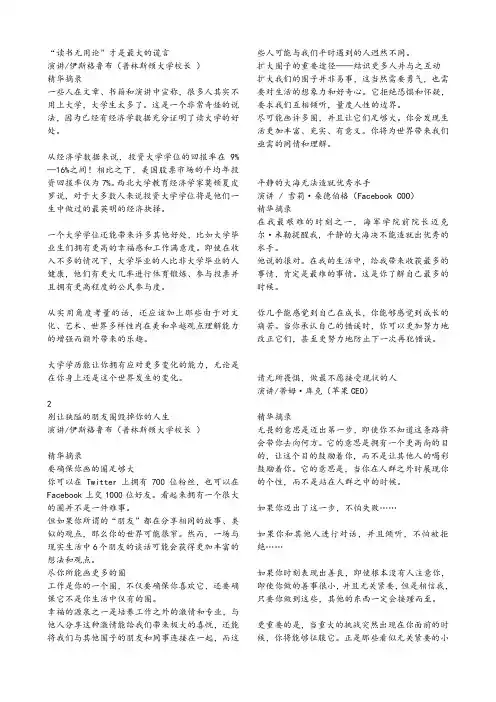
“读书无用论”才是最大的谎言演讲/伊斯格鲁布(普林斯顿大学校长)精华摘录一些人在文章、书籍和演讲中宣称,很多人其实不用上大学,大学生太多了。
这是一个非常奇怪的说法,因为已经有经济学数据充分证明了读大学的好处。
从经济学数据来说,投资大学学位的回报率在9%—16%之间!相比之下,美国股票市场的平均年投资回报率仅为7%。
西北大学教育经济学家莫顿夏皮罗说,对于大多数人来说投资大学学位将是他们一生中做过的最英明的经济抉择。
一个大学学位还能带来许多其他好处,比如大学毕业生们拥有更高的幸福感和工作满意度。
即使在收入不多的情况下,大学毕业的人比非大学毕业的人健康,他们有更大几率进行体育锻炼、参与投票并且拥有更高程度的公民参与度。
从实用角度考量的话,还应该加上那些由于对文化、艺术、世界多样性内在美和卓越观点理解能力的增强而额外带来的乐趣。
大学学历能让你拥有应对更多变化的能力,无论是在你身上还是这个世界发生的变化。
2别让狭隘的朋友圈毁掉你的人生演讲/伊斯格鲁布(普林斯顿大学校长)精华摘录要确保你画的圈足够大你可以在Twitter上拥有700位粉丝,也可以在Facebook上交1000位好友。
看起来拥有一个很大的圈并不是一件难事。
但如果你所谓的“朋友”都在分享相同的故事、类似的观点,那么你的世界可能很窄。
然而,一场与现实生活中6个朋友的谈话可能会获得更加丰富的想法和观点。
尽你所能画更多的圈工作是你的一个圈,不仅要确保你喜欢它,还要确保它不是你生活中仅有的圈。
幸福的源泉之一是培养工作之外的激情和专业,与他人分享这种激情能给我们带来极大的喜悦,还能将我们与其他圈子的朋友和同事连接在一起,而这些人可能与我们平时遇到的人迥然不同。
扩大圈子的重要途径——结识更多人并与之互动扩大我们的圈子并非易事,这当然需要勇气,也需要对生活的想象力和好奇心。
它拒绝恐惧和怀疑,要求我们互相倾听,量度人性的边界。
尽可能画许多圈,并且让它们足够大。
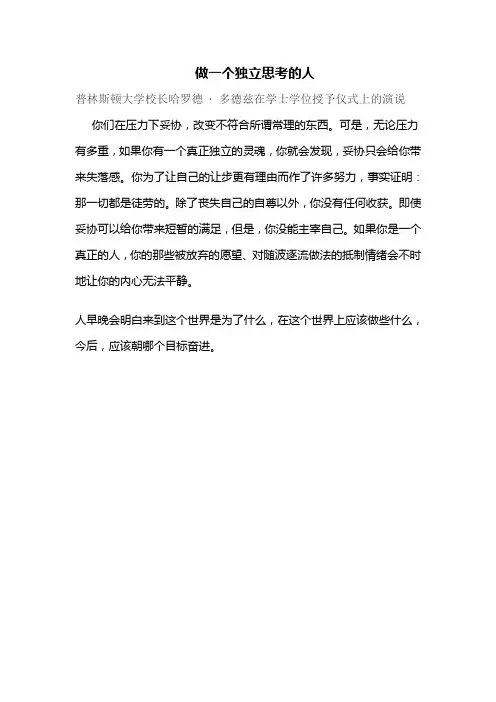
做一个独立思考的人
普林斯顿大学校长哈罗德·多德兹在学士学位授予仪式上的演说你们在压力下妥协,改变不符合所谓常理的东西。
可是,无论压力有多重,如果你有一个真正独立的灵魂,你就会发现,妥协只会给你带来失落感。
你为了让自己的让步更有理由而作了许多努力,事实证明:那一切都是徒劳的。
除了丧失自己的自尊以外,你没有任何收获。
即使妥协可以给你带来短暂的满足,但是,你没能主宰自己。
如果你是一个真正的人,你的那些被放弃的愿望、对随波逐流做法的抵制情绪会不时地让你的内心无法平静。
人早晚会明白来到这个世界是为了什么,在这个世界上应该做些什么,今后,应该朝哪个目标奋进。
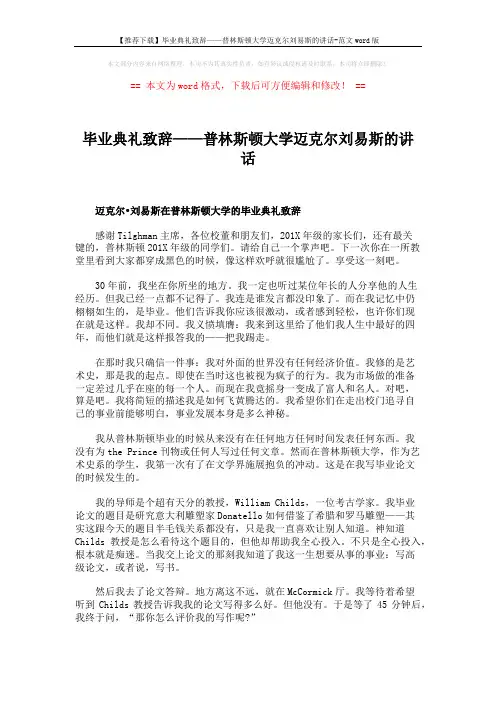
本文部分内容来自网络整理,本司不为其真实性负责,如有异议或侵权请及时联系,本司将立即删除!== 本文为word格式,下载后可方便编辑和修改! ==毕业典礼致辞——普林斯顿大学迈克尔刘易斯的讲话迈克尔•刘易斯在普林斯顿大学的毕业典礼致辞感谢Tilghman主席,各位校董和朋友们,201X年级的家长们,还有最关键的,普林斯顿201X年级的同学们。
请给自己一个掌声吧。
下一次你在一所教堂里看到大家都穿成黑色的时候,像这样欢呼就很尴尬了。
享受这一刻吧。
30年前,我坐在你所坐的地方。
我一定也听过某位年长的人分享他的人生经历。
但我已经一点都不记得了。
我连是谁发言都没印象了。
而在我记忆中仍栩栩如生的,是毕业。
他们告诉我你应该很激动,或者感到轻松,也许你们现在就是这样。
我却不同。
我义愤填膺:我来到这里给了他们我人生中最好的四年,而他们就是这样报答我的——把我踢走。
在那时我只确信一件事:我对外面的世界没有任何经济价值。
我修的是艺术史,那是我的起点。
即使在当时这也被视为疯子的行为。
我为市场做的准备一定差过几乎在座的每一个人。
而现在我竟摇身一变成了富人和名人。
对吧,算是吧。
我将简短的描述我是如何飞黄腾达的。
我希望你们在走出校门追寻自己的事业前能够明白,事业发展本身是多么神秘。
我从普林斯顿毕业的时候从来没有在任何地方任何时间发表任何东西。
我没有为the Prince刊物或任何人写过任何文章。
然而在普林斯顿大学,作为艺术史系的学生,我第一次有了在文学界施展抱负的冲动。
这是在我写毕业论文的时候发生的。
我的导师是个超有天分的教授,William Childs,一位考古学家。
我毕业论文的题目是研究意大利雕塑家Donatello如何借鉴了希腊和罗马雕塑——其实这跟今天的题目半毛钱关系都没有,只是我一直喜欢让别人知道。
神知道Childs教授是怎么看待这个题目的,但他却帮助我全心投入。
不只是全心投入,根本就是痴迷。
当我交上论文的那刻我知道了我这一生想要从事的事业:写高级论文,或者说,写书。
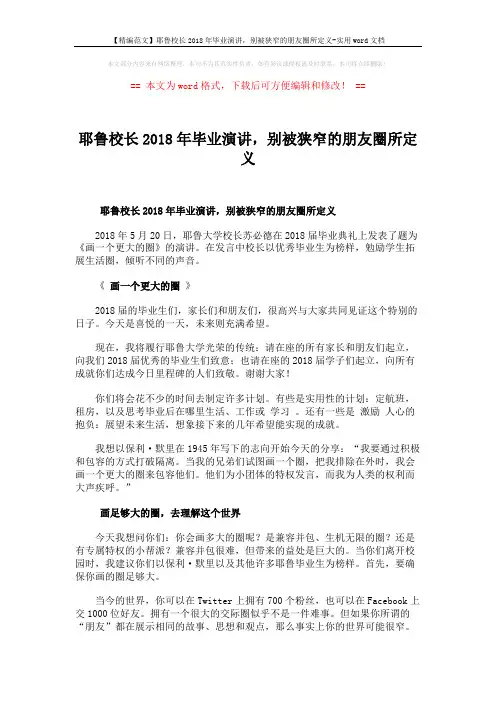
本文部分内容来自网络整理,本司不为其真实性负责,如有异议或侵权请及时联系,本司将立即删除!== 本文为word格式,下载后可方便编辑和修改! ==耶鲁校长2018年毕业演讲,别被狭窄的朋友圈所定义耶鲁校长2018年毕业演讲,别被狭窄的朋友圈所定义2018年5月20日,耶鲁大学校长苏必德在2018届毕业典礼上发表了题为《画一个更大的圈》的演讲。
在发言中校长以优秀毕业生为榜样,勉励学生拓展生活圈,倾听不同的声音。
《画一个更大的圈》2018届的毕业生们,家长们和朋友们,很高兴与大家共同见证这个特别的日子。
今天是喜悦的一天,未来则充满希望。
现在,我将履行耶鲁大学光荣的传统:请在座的所有家长和朋友们起立,向我们2018届优秀的毕业生们致意;也请在座的2018届学子们起立,向所有成就你们达成今日里程碑的人们致敬。
谢谢大家!你们将会花不少的时间去制定许多计划。
有些是实用性的计划:定航班,租房,以及思考毕业后在哪里生活、工作或学习。
还有一些是激励人心的抱负:展望未来生活,想象接下来的几年希望能实现的成就。
我想以保利·默里在1945年写下的志向开始今天的分享:“我要通过积极和包容的方式打破隔离。
当我的兄弟们试图画一个圈,把我排除在外时,我会画一个更大的圈来包容他们。
他们为小团体的特权发言,而我为人类的权利而大声疾呼。
”画足够大的圈,去理解这个世界今天我想问你们:你会画多大的圈呢?是兼容并包、生机无限的圈?还是有专属特权的小帮派?兼容并包很难,但带来的益处是巨大的。
当你们离开校园时,我建议你们以保利·默里以及其他许多耶鲁毕业生为榜样。
首先,要确保你画的圈足够大。
当今的世界,你可以在Twitter上拥有700个粉丝,也可以在Facebook上交1000位好友。
拥有一个很大的交际圈似乎不是一件难事。
但如果你所谓的“朋友”都在展示相同的故事、思想和观点,那么事实上你的世界可能很窄。
相比之下,与现实生活中的6个朋友聚在一起谈话,可能会让你获得更加多元的观点和意见。
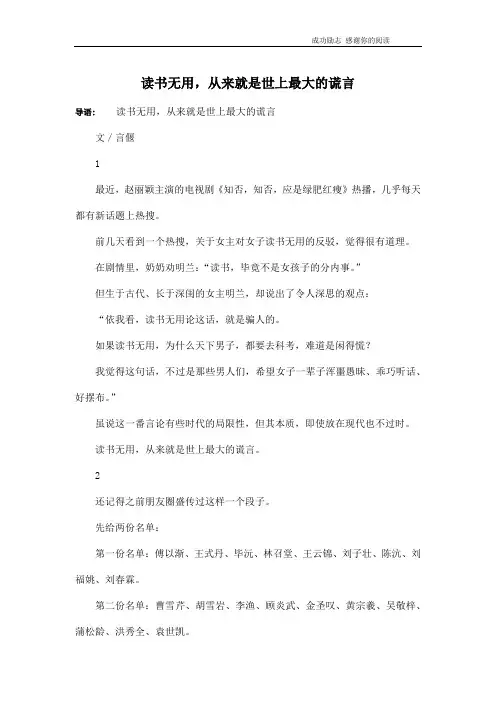
读书无用,从来就是世上最大的谎言导语:读书无用,从来就是世上最大的谎言文/言偃1最近,赵丽颖主演的电视剧《知否,知否,应是绿肥红瘦》热播,几乎每天都有新话题上热搜。
前几天看到一个热搜,关于女主对女子读书无用的反驳,觉得很有道理。
在剧情里,奶奶劝明兰:“读书,毕竟不是女孩子的分内事。
”但生于古代、长于深闺的女主明兰,却说出了令人深思的观点:“依我看,读书无用论这话,就是骗人的。
如果读书无用,为什么天下男子,都要去科考,难道是闲得慌?我觉得这句话,不过是那些男人们,希望女子一辈子浑噩愚昧、乖巧听话、好摆布。
”虽说这一番言论有些时代的局限性,但其本质,即使放在现代也不过时。
读书无用,从来就是世上最大的谎言。
2还记得之前朋友圈盛传过这样一个段子。
先给两份名单:第一份名单:傅以渐、王式丹、毕沅、林召堂、王云锦、刘子壮、陈沆、刘福姚、刘春霖。
第二份名单:曹雪芹、胡雪岩、李渔、顾炎武、金圣叹、黄宗羲、吴敬梓、蒲松龄、洪秀全、袁世凯。
问,哪份名单上你认识的人多一些?很明显,我们大部分人都不认识第一份的人,而熟悉第二份的人。
最后答案揭晓:前者全是清朝科举状元;后者全是当时的落榜秀才。
得出结论:会读书的人并不一定混得好,而读书考试不行的人,还更容易成功。
无数拥护“读书无用论”的人,转了这个段子,借此打脸那些认为“读书有用”的人。
的确,光看这份名单,这个结论真的很难让人反驳。
但是落榜秀才和状元,成功后面的问题,不应该被忽略。
据统计,中国历史上共产生700多名状元,约11万名进士。
除了极个别外,这些状元进士都在其岗位上做出了很好的业绩。
也就是说,这些人的成功有其必然性。
反观历史上的落第秀才呢?数不胜数。
其中能出现流芳千古的人,不足为奇,关键是,比例是多少呢?可能是0。
1%,抑或0。
01%。
可以说这些被历史铭记的落第秀才,纯属小概率事件。
用这样两份名单,来证明读书无用,说到底就是一种易得性偏差。
人们往往根据认知上的易得性,来判断事件的概率,而这往往会出现偏差。
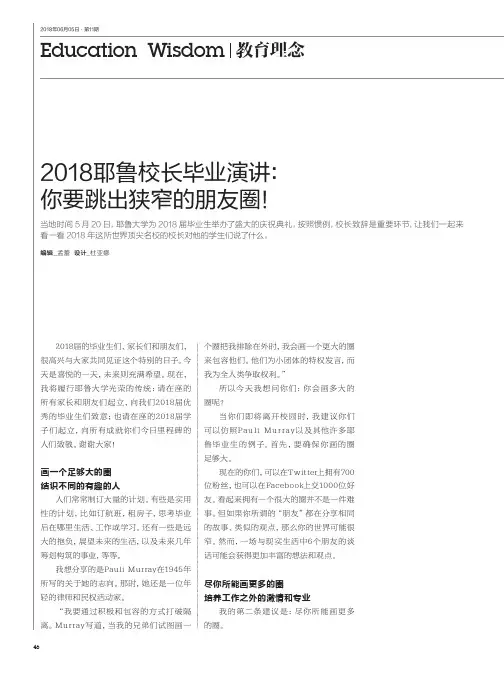
462018届的毕业生们、家长们和朋友们,很高兴与大家共同见证这个特别的日子。
今天是喜悦的一天,未来则充满希望。
现在,我将履行耶鲁大学光荣的传统:请在座的所有家长和朋友们起立,向我们2018届优秀的毕业生们致意;也请在座的2018届学子们起立,向所有成就你们今日里程碑的人们致敬。
谢谢大家!画一个足够大的圈结识不同的有趣的人人们常常制订大量的计划。
有些是实用性的计划,比如订航班,租房子,思考毕业后在哪里生活、工作或学习。
还有一些是远大的抱负,展望未来的生活,以及未来几年筹划构筑的事业,等等。
我想分享的是Pauli Murray在1945年所写的关于她的志向。
那时,她还是一位年轻的律师和民权活动家。
“我要通过积极和包容的方式打破隔离。
Murray写道,当我的兄弟们试图画一个圈把我排除在外时,我会画一个更大的圈来包容他们。
他们为小团体的特权发言,而我为全人类争取权利。
”所以今天我想问你们:你会画多大的圈 呢?当你们即将离开校园时,我建议你们可以仿照Pauli Murray以及其他许多耶鲁毕业生的例子。
首先,要确保你画的圈足够大。
现在的你们,可以在Twitter 上拥有700位粉丝,也可以在Facebook 上交1000位好友。
看起来拥有一个很大的圈并不是一件难事。
但如果你所谓的“朋友”都在分享相同的故事、类似的观点,那么你的世界可能很窄。
然而,一场与现实生活中6个朋友的谈话可能会获得更加丰富的想法和观点。
尽你所能画更多的圈培养工作之外的激情和专业我的第二条建议是:尽你所能画更多的 圈。
教育理念2018年06月05日·第11期Education Wisdom编辑_孟蕾 设计_杜亚娜2018耶鲁校长毕业演讲:你要跳出狭窄的朋友圈!当地时间5月20日,耶鲁大学为2018届毕业生举办了盛大的庆祝典礼,按照惯例,校长致辞是重要环节,让我们一起来看一看2018年这所世界顶尖名校的校长对他的学生们说了什么。
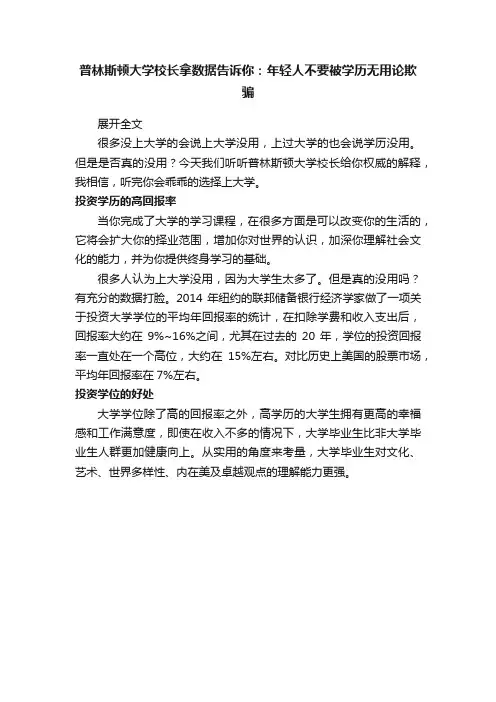
普林斯顿大学校长拿数据告诉你:年轻人不要被学历无用论欺骗展开全文很多没上大学的会说上大学没用,上过大学的也会说学历没用。
但是是否真的没用?今天我们听听普林斯顿大学校长给你权威的解释,我相信,听完你会乖乖的选择上大学。
投资学历的高回报率当你完成了大学的学习课程,在很多方面是可以改变你的生活的,它将会扩大你的择业范围,增加你对世界的认识,加深你理解社会文化的能力,并为你提供终身学习的基础。
很多人认为上大学没用,因为大学生太多了。
但是真的没用吗?有充分的数据打脸。
2014年纽约的联邦储备银行经济学家做了一项关于投资大学学位的平均年回报率的统计,在扣除学费和收入支出后,回报率大约在9%~16%之间,尤其在过去的20年,学位的投资回报率一直处在一个高位,大约在15%左右。
对比历史上美国的股票市场,平均年回报率在7%左右。
投资学位的好处大学学位除了高的回报率之外,高学历的大学生拥有更高的幸福感和工作满意度,即使在收入不多的情况下,大学毕业生比非大学毕业生人群更加健康向上。
从实用的角度来考量,大学毕业生对文化、艺术、世界多样性、内在美及卓越观点的理解能力更强。
学位在工作中的优势有很多人认为,在没有大学学位的情况下,自己也可以学习一门技艺,比如:焊工。
他们有的比大学生赚得也要多。
尽管如此,那也建议你读完大学在成为一名焊工。
因为随着技术得发展,你的手艺有一天可能就会被淘汰,这是很现实的问题,也许会因为伤病导致你再无法胜任,或者你想进入管理层。
大学学历这时候就有明显的优势,不管是你身体无法胜任还是世界发生了变化,它能让你拥有应对更对变化的能力。
尽管在教育投资的前期,显示出了投入的昂贵,但是这种投资是由意义的,因为高等教育依赖于高质量的教室队伍。
同时回报率也是显著可见的。
有很多人想少读书而获得更高的回报率,他们渴望短期的受益,仅仅看到了大学的费用和第一份工作的薪水。
大学教育是一项长期的投资,它可以让毕业生不断发展自己和适应世界。
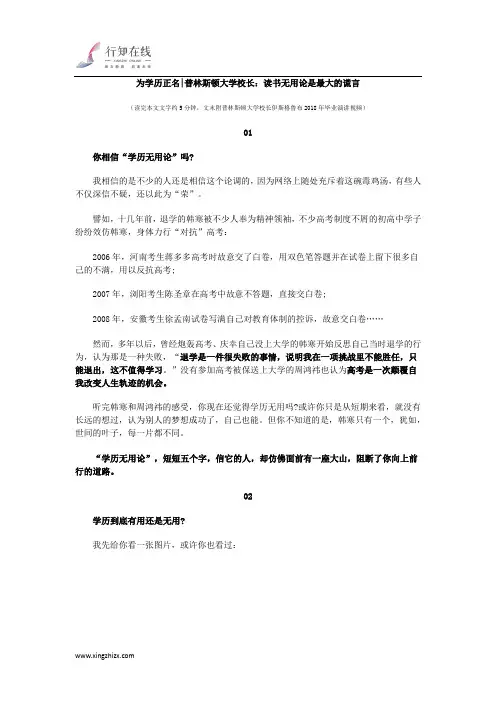
为学历正名|普林斯顿大学校长:读书无用论是最大的谎言(读完本文文字约5分钟,文末附普林斯顿大学校长伊斯格鲁布2018年毕业演讲视频)01你相信“学历无用论”吗?我相信的是不少的人还是相信这个论调的,因为网络上随处充斥着这碗毒鸡汤,有些人不仅深信不疑,还以此为“荣”。
譬如,十几年前,退学的韩寒被不少人奉为精神领袖,不少高考制度不屑的初高中学子纷纷效仿韩寒,身体力行“对抗”高考:2006年,河南考生蒋多多高考时故意交了白卷,用双色笔答题并在试卷上留下很多自己的不满,用以反抗高考;2007年,浏阳考生陈圣章在高考中故意不答题,直接交白卷;2008年,安徽考生徐孟南试卷写满自己对教育体制的控诉,故意交白卷……然而,多年以后,曾经炮轰高考、庆幸自己没上大学的韩寒开始反思自己当时退学的行为,认为那是一种失败,“退学是一件很失败的事情,说明我在一项挑战里不能胜任,只能退出,这不值得学习。
”没有参加高考被保送上大学的周鸿祎也认为高考是一次颠覆自我改变人生轨迹的机会。
听完韩寒和周鸿祎的感受,你现在还觉得学历无用吗?或许你只是从短期来看,就没有长远的想过,认为别人的梦想成功了,自己也能。
但你不知道的是,韩寒只有一个,犹如,世间的叶子,每一片都不同。
“学历无用论”,短短五个字,信它的人,却仿佛面前有一座大山,阻断了你向上前行的道路。
02学历到底有用还是无用?我先给你看一张图片,或许你也看过:相信你已经看出来了。
不错,这是去年12月份初刷爆社交网络的乌镇互联网饭局。
这场饭局汇聚了中国最顶尖互联网公司的负责人,更引人瞩目的是,这场饭局的大佬们都是名校毕业。
若是这不能让你相信学历是有用的,那你再来看看前几天普林斯顿大学校长伊斯格鲁布在2018年毕业典礼上发表的演讲,我觉得他的演讲,终于为学历有用而正名,并且直接怼了坚信且发表“学历无用论”的一批人。
他说,“别再相信学历无用论,他会害了你。
因为从经济学数据来说,投资大学学位的回报率在9%—16%之间!”他还补充说,“过去20年,投资回报率一直都是15%,任何专业领域,读完大学的年平均回报率都在9%—16%,再加上健康、幸福指数、生活质量等等额外的收益,怎么还会有人觉得,上大学时无用的呢?”他强调,“上大学是一笔高回报的投资,尤其从长远来看,年轻人应将眼光放远,不该被学历无用的论调欺骗,这种论调会破坏年轻人的前途和国家的未来。
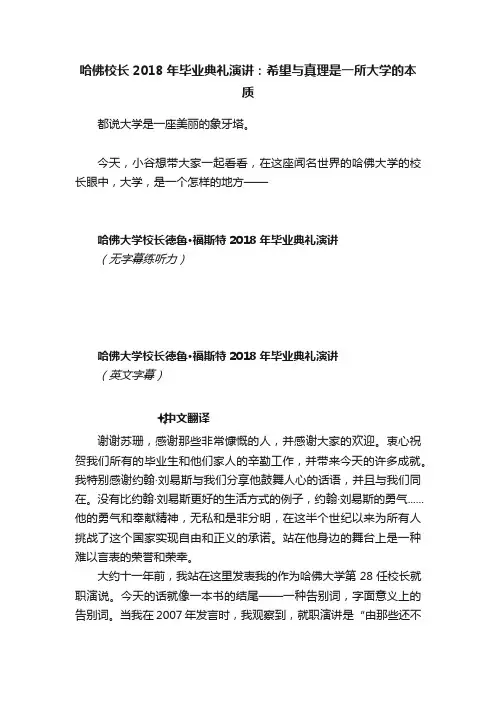
哈佛校长2018年毕业典礼演讲:希望与真理是一所大学的本质都说大学是一座美丽的象牙塔。
今天,小谷想带大家一起看看,在这座闻名世界的哈佛大学的校长眼中,大学,是一个怎样的地方——哈佛大学校长德鲁·福斯特2018年毕业典礼演讲(无字幕练听力)哈佛大学校长德鲁·福斯特2018年毕业典礼演讲(英文字幕)✨中文翻译谢谢苏珊,感谢那些非常慷慨的人,并感谢大家的欢迎。
衷心祝贺我们所有的毕业生和他们家人的辛勤工作,并带来今天的许多成就。
我特别感谢约翰·刘易斯与我们分享他鼓舞人心的话语,并且与我们同在。
没有比约翰·刘易斯更好的生活方式的例子,约翰·刘易斯的勇气......他的勇气和奉献精神,无私和是非分明,在这半个世纪以来为所有人挑战了这个国家实现自由和正义的承诺。
站在他身边的舞台上是一种难以言表的荣誉和荣幸。
大约十一年前,我站在这里发表我的作为哈佛大学第28任校长就职演说。
今天的话就像一本书的结尾——一种告别词,字面意义上的告别词。
当我在2007年发言时,我观察到,就职演讲是“由那些还不知道他们在谈论什么的人定义的宣言”。
现在,我不能再援引这个借口了。
我几乎知道我作为哈佛校长的所有想法。
但是我接着说了一些关于就职演讲的独特类型的话:我们可以把它们重复一下,就像我之前所说的那样,“不被经验之杖改变的对希望的表达。
”现在,我应该知道那个杖。
在我的脑海里,我听到我年轻时的吉米·亨德里克斯问道:“你有经验吗?”我必须肯定地回答。
也许并不像查尔斯·威廉·艾略特那样有经验,他在哈佛大学任职40年,但是11年对我来说已经是很长的一段时间。
想想吧:我发表就职演讲和iPhone在2007年夏天发布的时间间隔在48小时之内。
我们所有人现在都非常依恋我们的设备,这看起来几乎不可想象,他们并不总是在那里。
智能手机发起了一场关于我们如何沟通,如何互动,如何组织我们生活的革命。
普林斯顿校长开学演讲:我们都是脆弱的有缺陷的,但我们可以触及星空,成就大业【导读】当地时间8月29日,美国常春藤名校普林斯顿大学校长伊斯格鲁布(Christopher L. Eisgruber)在学校容纳近千人的小礼堂发表2021年度的开学演讲。
他说,我希望你们会有很多快乐的经历,但我知道在你们前进的道路上,也会有挑战和困难的时刻。
他分享了自己面临的疾病的挑战和4个人生教训,他说,同样的脆弱和渴望的结合激发了这所大学的使命。
敢于分享脆弱,方可得到刚强。
在普林斯顿大学2021年秋季开学上的演讲见到你们真高兴。
能在一起真好。
在过去的一年里,我一直想念集体欢乐和激动的时刻!在大学入学周,大家都很兴奋。
当然,大学的经历并非全部——或者大部分都不是关于庆祝或狂欢的。
它首先和学习、成长有关——如詹妮弗·莫顿(Jennifer Morton)在其著作中所述的脱胎换骨(transformation)。
我希望你们会有很多快乐的经历,但我知道在你们前进的道路上,也会有挑战和困难的时刻。
在你们今天开始这段旅程的时候,我想和你们分享我最近面临的一个挑战,并分享我从中吸取的四个教训,这些感悟或许有助于你们更好地度过普林斯顿的大学生涯。
五年前,我做了核磁共振检查。
检查结果没什么大问题,但是却发现我得了听神经瘤(acoustic neuroma)。
这种神经瘤生长缓慢,有点像我们很多人皮肤上长的痣。
然而,这个瘤的位置长得相当不是地方,它位于耳朵内部深处的神经上。
这是一种良性的、不会发生癌变的脑肿瘤。
当听神经瘤生长时,它们会导致听力、平衡或控制面部肌肉的能力丧失。
我的听力有些下降。
我可能也失去了一点平衡,但我的行动总是有点笨拙,所以不太确定。
例如,当我走在通向讲台的陡峭狭窄的楼梯时,我必须非常小心。
幸运的是,听神经瘤通常生长非常缓慢,每年生长以毫米计。
有时它们停止生长。
如果只是小的听神经瘤可以等待,不去治疗,看看它是否增长,或放射治疗,或手术切除。
As a kid, I spent my summers with my grandparents on their ranch(牧场)in Texas(德克萨斯). I helped fix windmills(风车), vaccinate cattle(给牛接种疫苗), and do other chores(杂务). We also watched soap operas(肥皂剧)every afternoon, especially “Days of our Lives.”My grandparents belonged to a Caravan(乘拖车度假)Club, a group of Airstream trailer(车屋)owners who travel together around the U.S. and Canada. And every few summers, we’d join the caravan. We’d hitch(钩住)up the Airstream trailer to my grandfather’s car, and off we’d go, in a line with 300 other Airstream adventurers. I loved and worshipped(崇敬)my grandparents and I really looked forward to these trips. On one particular(特别的)trip, I was about 10 years old. I was rolling around in the big bench seat in the back of the car. My grandfather was driving. And my grandmother had the passenger seat. She smoked throughout these trips, and I hated the smell.童年时,夏天都是在姥爷的德克萨斯牧场里度过。
乔布斯在斯坦福大学的演讲(中英双语)I am honored to be with you today at your commencement from one of the finest universities in the world. Truth be told, I never graduated from college, and this is the closest I've ever gotten to a college graduation. Today I want to tell you three stories from my life. That's it. No big deal. just three stories.我今天很荣幸能和你们一起参加这所世界上最好的大学的毕业典礼。
说实话,我从未大学毕业,这该算是我一生中离大学毕业最近的一次了。
今天我想向你们讲述我人生中的三个故事,没什么大不了的,只是三个故事而已。
[1] The first story is about connecting the dots.第一个故事是关于串联生命中的点点滴滴。
I dropped out of Reed College after the first 6 months, but then stayed around as a drop-in for another 18 months or so before I really quit. So why did I drop out?我在里德大学只读了六个月就退学了,但之后仍作为旁听生呆了一年半后才最终离开。
我为什么要退学呢?It started before I was born. My biological mother was a young, unwed college graduate student, and she decided to put me up for adoption. She felt very strongly that I should be adopted by college graduates, so everything was all set for me to be adopted at birth by a lawyer and his wife. Except that when I popped out they decided at the last minute that they really wanted a girl.那要从我出生的时候讲起。
耶鲁大学名言中英文1. 哈佛,麻省理工,哥伦比亚,耶鲁等大学校长名言对不起,暂时只找到了哈佛的。
哈佛校长语录心态法则哈佛大学校长德雷科。
鲍克说:每一位求职者都希望找到一个能发挥自己特长、待遇又高的工作,然而在实际择业过程中,这样两全其美的好事确实很难遇到。
这其中的原因固然很多,但有一个很重要的原因就是:求职者能否客观看待择业。
小毛驴的犹豫——许多人在选择职业、成就事业时,都会存在“小毛驴的犹豫”:一头小毛驴,在干枯的草原上好不容易找到了两堆草,但是一再迟疑,不知道哪一堆更好,结果活活饿死了。
这就告诫我们人的期望值不可太高,绝不可以左顾右盼而错失良机。
做梦娶美人——志大才疏,眼高手低,大事做不来,小事不肯做。
这种人想干好工作,成就事业,只能是做梦娶美人——尽想好事。
总想拣个大西瓜——求职者往往在择业时挑肥拣瘦,到头来却两手空空,一事无成,因此,求职者在择业前,应把自己的专业特长与用人单位的需求实际结合起来,对照、衡量后再去择业。
观念法则看重工作发展前景胜于薪水——随着竞争的加剧和收入的普遍提高,个人的发展和前途已成为择业者关注的焦点。
选择工作时,薪水不再是员工择业的首要考虑因素,取而代之的是个人发展和企业的前景。
先就业后择业——尽管就业形势各国有所不同,但对于求职者择业而言,受工作经验等多种因素的制约,要想找到一份理想的工作,还有一定的难度。
2. 急楼主搞错了!这段诗歌是美国人Dorothy Law Nolte写的,题目是"Children Learn What They Live"。
这首诗有很多不同版本,比较完整的一版全文如下:Children Learn What They LiveIf children live with criticism, they learn to condemn.If children live with hostility, they learn to fight.If children live with fear, they learn to be apprehensive.If children live with pity, they learn to feel sorry for themselves.If children live with ridicule, they learn to feel shy.If children live with jealousy, they learn to feel envy.If children live with shame, they learn to feel guilty.ButIf children live with encouragement, they learn confidence.If children live with tolerance, they learn patience.If children live with praise, they learn appreciation.If children live with acceptance, they learn to love.If children live with approval, they learn to like themselves.If children live with recognition, they learn it is good to have a goal.If children live with sharing, they learn generosity.If children live with honesty, they learn truthfulness.If children live with fairness, they learn justice.If children live with kindness and consideration, they learn respect.If children live with security, they learn to have faith in themselves and in those about them.If children live with friendliness, they learn the world is a nice place in which to live.With what is your child living?附作者简介:罗乐德(Dorothy Law Nolte,1924年1月12日—2005年11月6日,又译诺尔蒂或多洛西·罗·诺特)是美国的著名社会学家及精神治疗师,擅长于家庭动力学(Family Dynamics)。
大学为什么不能改变命运? 我们都是大学的灾民周伯通周伯通 2010-10-21 21:23:02当大学成为消灭童年、浪费青春、消磨斗志、却回报渺茫的人生圈套,知识就无力改变个人命运;当大学成为官场、商场、欢乐场与名利场,大学的谎言就毁了中国精英的生长土壤——可敬的大学,就成了可怕的大学。
大学为什么不能改变命运?“都说知识改变命运,我学了这么多知识,也不见命运有何改变?”2009年,上海海事大学法学系研究生杨元元自杀前如是说。
“耶鲁改变了我一生。
”2010年,耶鲁毕业的中国人张磊公开告白说。
他要给耶鲁捐款888.8888万美元,据说是给耶鲁大学管理学院捐款最多的人。
两者皆拿一生的命运说事。
杨元元的话让公众质问教育,张磊被公众质问为什么不给中国的母校捐款——好在,仍有天涯网友为他解围:“捐到耶鲁不一定能体现价值,但是捐到国内一定体现不出价值。
”2009年,重庆上万农村高三应届考生拒绝了高考,湖北省2.6万学生放弃了高考:2010年,中国高考报名总人数比2009年减少了65万人。
新的“读书无用论”正在抬头——《中国青年报》曾报道一个小故事,表弟是一位装修工,平均每月可以拿到2500 元左右。
表哥大学毕业快一年了,还没有找到工作。
农民工表弟因而深有感触地说:“我真谢谢我自己,没有考上大学。
”大学为什么不能改变我们的命运?也许,全因我们与大学的关系早已改变。
古时,彼此是家庭关系,“养不教,父之过;教不严,师之惰”;1919年以后,蔡元培要把京师大学堂变成现代大学时,学校自治,学生自由,彼此是朋友关系;1952年以后,中国大学学习斯大林模式,大学其实是高等技术专科学校,都是为社会服务的螺丝钉,彼此是同事关系;1977年,关闭11年的高考闸门再次开启,大学得到了一批最有理想主义的追求者,彼此是恋爱关系;到了2010年,大学招生推动GDP、大学城建立拉动房地产,彼此早就成了交易关系。
当我们与大学失去了亲近如父子、知心如朋友的精神伦理,大学就只剩满足短期需要的供需关系。
失败是生活和学习的一部分-普林斯顿大学2013毕业演讲失败是生活和学习的一部分——伯南克在普林斯顿大学2013届毕业典礼上的演讲重返普林斯顿的感觉实在太美妙了。
令人难以置信的是自我告别校园远赴华盛顿已达16年之久。
近日,我写信去询问一些有关我的教职的事,并得到如下回复:很遗憾,普林斯顿收到很多更有才华的学者的求职信,而教职有限。
我将在稍后的时间里表达我对毕业生们的恭贺,但我更想先恭贺在座的家长们。
同样作为父母,我切身体会到供一个孩子完成学业绝非易事。
几年前,我的一个同事,尽管他和他的妻子都不毕业于普林斯顿,他们仍旧将孩子送进了这里。
他们都引以为傲,就好像在这儿念书的是自己一样。
但我的同事也常说,从经济角度讲,这无异于每年新买一辆凯迪拉克,然后直接将它开落悬崖。
不过他总补充道:如果一切重来,他仍会毫不犹豫地这样做。
所以,请对你们的父母、家庭心存感激。
今年毕业典礼的前几分钟,我将提出“十个建议”,或称之为对这个世界和你们毕业后的生活的十个观察。
请注意,这十点与利率毫无关系。
我之所以有资格提出这些建议或观察,除了普林斯顿的善意邀请外,理由和你们讨厌哥哥姐姐可以晚睡是一个道理:我比你们更老。
以下内容均经受过生活的检验,但以往表现并不能确保未来的结果。
一、一个“当代哲学家”阿甘讲到了人生和一盒巧克力的共同之处:你永远也无法预料下一块巧克力的味道。
人生确实难以预料。
如果22岁的你们认为自己已经清晰地预见到了16年后、甚至30年后的自己,我只能说这是想象力匮乏的表现。
看看我吧,12年前我一心教经济学入门课程,想着编造什么理由不去参加教学会议,结果我接到了来自华盛顿的电话。
如果你对阿甘的洞悉持有怀疑态度的话,你可以试着这样去做:花些时间与那些阔别校园25年、30年甚至40年的校友交流,问问那些人,如果时光倒流,在他们即将毕业之际,他们曾满怀希望的未来如今怎样?如果他们能够敞开心扉,他们会告诉你他们如今是否春风得意,会告诉你他们曾经历的高峰和低谷。
演讲稿英文版:In a few minutes, all of you will march through FitzRandolph Gate as newly minted graduates of this University. Before you do, it is my privilege to say a few words about the path that lies ahead. It is indeed a privilege, and also a joy, to address you, for all of you who graduate today have accomplished something genuinely important and worth celebrating.You have completed a demanding course of study. It will transform your life in many ways. It will expand the range of vocations you can pursue, increase your knowledge of the world, deepen your capacity to appreciate societies and cultures, and provide a foundation for lifelong learning.So we celebrate here on the lawn in front of Nassau Hall, as do other college communities in courtyards, auditoria, arenas, and stadia around the country. Graduates toss caps in the air and professors applaud. Families cheer and holler enthusiastically. Yet, even as we do so, we see a strange trend from columnists, bloggers, think tanks, and politicians. In essays, books, and speeches, some of them suggest that too many students are earning college degrees.Too many college graduates: that is a very odd claim, because the economic evidence for the value of a college degree is overwhelming. For example, in 2014, economists Jaison Abel and Richard Deitz of the Federal Reserve Bank of New York estimated the average annual return on investment from a college degree, net of tuition paid and lost earnings, at between 9 percent and 16 percent per year for a lifetime (1). For the last two decades, the return on investment has hovered at the high end of that range, around 15 percent per year.By comparison, the historical average return on investments in the American stock market is around 7 percent per year. That is why my friend Morton Shapiro, the president of Northwestern University and a leading educational economist, says that for most people, the decision to invest in a college degree will be “the single best financial decision they make in a lifetime,”even if judged purely in terms of financial return on investment.A degree conveys many other benefits as well. For example, college graduates report higher levels of happiness and job satisfaction, even after controlling for income. College graduates are healthier than non-graduates. They are more likely to exercise, more likely to vote,and have higher levels of civic engagement. To these pragmatic considerations we should add the joys that come with an increased capacity to appreciate culture, the arts, the world’s diversity, and the inherent beauty of extraordinary ideas.The numbers I have quoted are not specific to Princeton. On the contrary, they are averages over all four-year degrees, in all fields, from all colleges in the United States. Think about that for a moment: on average, all degrees in all fields from all colleges generate an annual return between 9 percent and 16 percent, and this return is supplemented by additional benefits to health, happiness, and quality of life. How could anyone think we need fewer college graduates?Some people answer that you can learn a trade without getting a college degree. Welders, they observe, can make more money than many college graduates. That’s true. There are, of course, reasons why you might want to get a college degree even if you plan to become a welder. You might worry, for example, about what happens if technology renders your trade obsolete, or arthritis leaves you unable to practice it, or you want to move into management or explore other interests. A college degree equips you to respond to the changes —to yourself, and to the world —that inevitably occur over a lifetime.Still, if pundits and politicians were saying only that America needs better vocational training, I could agree wholeheartedly. It would be terrific if more people could get the training they need to practice a trade. But at the same time it would also be great if more people, not fewer, could receive the extraordinary benefits that come with a college degree.So I ask again: why would anyone think we need fewer college graduates? I think there is a simple answer. Education requires high-quality teaching. Teaching, in turn, depends upon skilled labor, which is expensive. As a result, the up-front cost for education is real, large, and easy to measure. The returns are equally real and even larger, but they accrue over a lifetime, are hard to measure, and vary from person to person. It is tempting to wish that you could get more certainty at lower cost.The people who call for fewer degrees yield to that temptation. They emphasize the short-term. They focus almost entirely on the price of college and on the salaries students might earn in their first jobs. That is a mistake.A college education is a long-term investment. It enables graduates to develop and adapt, and it pays off spectacularly in the long run. The idea that we would be better off with fewer college graduates is a short-term swindle, a swindle that will cheat America’s young people, weaken the nation’s economy, and undermine our future. We need to have the confidence to invest in our young people and to ensure that a college education is accessible and affordable for students from all backgrounds and financial circumstances.I hope that all of you who graduate today, and who experience the power of education in your own lives, will become advocates for the value of higher education in our society. There is a national conversation taking place right now about the value of higher education, and we need your voice in that conversation. We need you, in other words, to help others to achieve in the future what you achieve today.How can you help more students earn college degrees? Here are three suggestions. First, become advocates for the importance of completion rates. A college education produces a tremendous return—if you get the degree. Returns are much lower if you start college but do not get the degree. The highest default rates on student loans do not involvecollege graduates with big debts. They instead involve students with small debts who never finish college and so never get the earnings boost that comes with a degree.A few moments ago, we awarded an honorary degree to President Barbara Gitenstein. Over her nearly two decades leading The College of New Jersey, she raised the College’s four-year graduation rate from 58 percent to 75 percent, a number that puts TCNJ’s on-time completion rate among the top ten in the nation for public colleges and universities. By raising TCNJ’s graduation rate, President Gitenstein has improved the lives of thousands of students who might have left school with debt but no degree. Be an advocate for higher education leaders like Bobby Gitenstein, and for colleges like TCNJ that commit to improving completion rates.Second, support America’s public institutions of higher education. State subsidies for public colleges and universities have declined precipitously, and state funding represents an increasingly small share of the budget at public research universities. At the University of Michigan, for example, state funding now accounts for only about 9 percent of total revenues. In the 1950s, by contrast, that number was 80 percent. Tuition at state universities has risen notbecause they have increased their expenditures per student, but because state legislatures have hollowed out their other sources of support.America depends on its public colleges and universities. They are engines of social mobility and innovation. Princeton and other private universities make essential contributions to the nation and the world —but there is no way that we could ever replace America’s great public institutions. They are a national treasure, and I urge you to support them.Third, stand up for the importance of enabling more students from low-income families to earn college degrees. Princeton’s Great Class of 2018 graduates today as the most socioeconomically diverse class in the 272-year history of this University. You will not hold that record for long. Other classes already at Princeton will break your record. Our graduate programs are likewise drawing upon new sources of talent: this spring we admitted the most socioeconomically diverse class of doctoral students in Princeton University’s history.At Princeton we believe in socioeconomic diversity because we know that to achieve excellence as a University and as a nation we must drawtalent from every sector of society. We know, too, that a Princeton degree is a rocket-booster for students seeking socioeconomic mobility. If we want to heal the divisions that inequality has produced in this country, we must ensure that students from low-income backgrounds receive the educations they need to develop their abilities and contribute to our society.As I look out at our extraordinary class of undergraduate, masters, and doctoral degree recipients, I take pride in your excellence and your diversity, and I am excited about the contributions you will make in the years ahead. The world needs more college degrees, not fewer. We need more celebrations like the one we hold today, with more proud families and happy graduates ready to go out and make a positive difference in the world. All of us on this platform are thrilled to be a part of your celebration. We applaud your achievements. We send our best wishes as you begin the adventures that lie ahead, and we look forward to welcoming you back to this campus on future visits. To the Great Class of 2018 and all of our graduates, congratulations!演讲稿中文版:几分钟后,作为这所大学新一批的毕业生,你们都会走出校门。